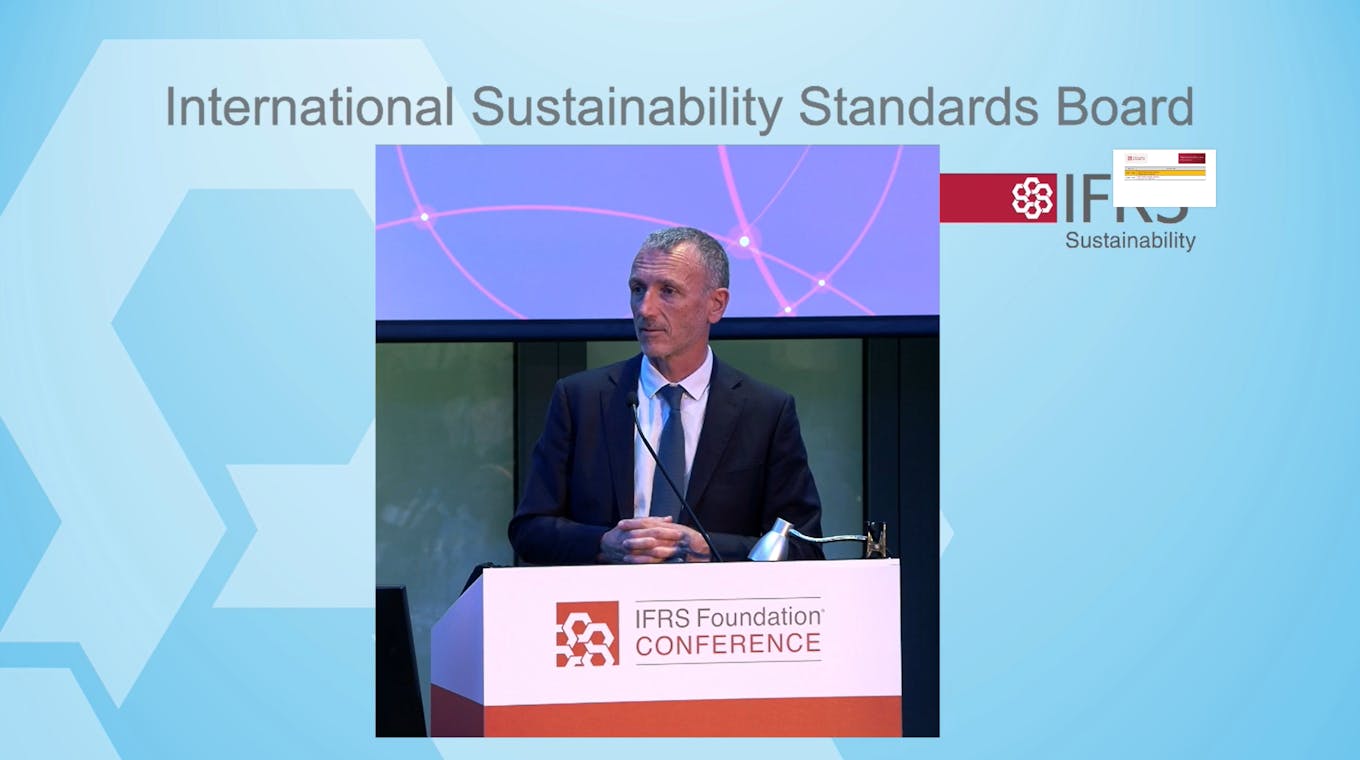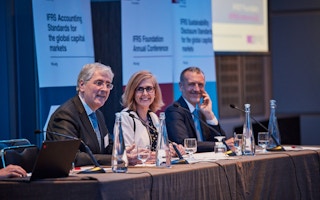Following a three-month consultation exercise last year, the International Sustainability Standards Board (ISSB) has published its highly-anticipated disclosure standards, which cover general sustainability concerns (IFRS S1) and climate disclosures (IFRS S2) on Monday (26 Jun).
To continue reading, subscribe to Eco‑Business.
There's something for everyone. We offer a range of subscription plans.
- Access our stories and receive our Insights Weekly newsletter with the free EB Member plan.
- Unlock unlimited access to our content and archive with EB Circle.
- Publish your content with EB Premium.
The new standards will be effective from January 2024, but they are up to individual countries to make mandatory.
ISSB’s inaugural standards consolidates several existing disclosure standards, including those developed by the Task Force on Climate-related Financial Disclosure (TCFD), the Sustainability Accounting Standards Board (SASB), the International Integrated Reporting Council, and the CDP’s Climate Disclosure Standards Board (CDSB).

ISSB chair Emmanuel Faber delivering his keynote speech at the IFRS Foundation’s annual conference 2023. Image: IFRS Foundation
At the official launch of the standards at the International Financial Reporting Standards (IFRS) Foundation’s annual conference on the same day, ISSB chair Emmanuel Faber said that ISSB stood on the shoulders of these organisations that came before it to develop an accounting-based language for sustainability reporting.
Faber contrasts the new “consistent, comprehensive language” with the “discrete suite” of environmental, social and governance (ESG) metrics and disclosures which could be inconsistent, competitive, redundant, or overlapping with each other.
ISSB’s efforts to support the adoption of these new standards will include creating a Transition Implementation Group to support companies in applying the standards, as well as launching capacity-building initiatives. No further details have been given about these initiatives.
“
We are very clear that capacity building will be front and centre of our work for the next several months and probably several years, working with everyone… to ensure that this language is effectively used.
Emmanuel Faber, chair of the ISSB
IFRS has put out a call on its website calling for suitable candidates to join the new working group, which aims to provide a forum for the discussion of implementation questions and actions needed to address them. The ISSB said it is looking for a “diverse mix of candidates” that “include representative expertise across a broad spread of geographies, company sizes and industries.” The deadline for member applications is the end of June.
Concerns raised during consultation period on the draft sustainability disclosure standards last year – which attracted over 1,400 pieces of feedback – included questions about the application of the proposals by smaller companies and those in emerging markets.
In a move to tackle such concerns, ISSB opened a Beijing office a week ahead of the global standards launch to bolster capacity-building efforts for emerging economies and small and medium-enterprises (SMEs). The Beijing office is headed by former director general at China’s finance ministry Zhang Zhengwei, and adds to IFRS’ presence in London, Tokyo, Frankfurt, Montreal, and San Francisco.
ISSB and GRI: Using two standards together?
A significant majority of companies in the Association of Southeast Asian Nations (Asean) currently use the Global Reporting Initiative (GRI) standards, according to a study by GRI and the National University of Singapore (NUS) last year. Of the top 100 largest listed companies sampled, 85 per cent use GRI standards – ranging from over 90 per cent of companies in Singapore, to about 65 per cent in Vietnam.
In March 2022, the IFRS Foundation and the Global Reporting Initiative (GRI) adopted a formal agreement to collaborate on the development of sustainability-related disclosures and ensure the interoperability of both reporting standards.
GRI CEO Eelco van der Enden congratulated ISSB on its “significant milestone” towards strengthening the global sustainability reporting system, emphasing the “distinct yet complementary purposes” both standards play.
Following ISSB’s latest standards, GRI has updated that a technical mapping of both standards is under development, alongside examples of how to use them in tandem and a digital taxonomy to streamline the reporting exercise.
As Eco-Business reported in March this year, differences between the world’s two largest sustainability reporting standard-setters have kept them from merging, despite previously being under pressure to join forces.
ISSB is more focused on “financial materiality”, or the impact of sustainability-related issues on its financial position, while GRI is more concerned with “impact materiality”, or an entity’s impact on the environment and society. Taken together, they make up the concept of “double materiality”, which forms the basis of the forthcoming European Sustainability Reporting Standards (ESRS) being created by the European Union (EU).
In spite of widespread support of efforts to harmonise global reporting standards, there have also been signs of internal disagreements within ISSB on these efforts. In a meeting this February, vice-chair Jingdong Hua, former World Bank vice-president, voted against the inclusion of GRI and ESRS as sources of guidance in an appendix to the ISSB rules, which permits reference to them in the absence of a relevant IFRS sustainability standard. He was the only one of the 14 board members to have voted against this proposal.
“If we were to be the global baseline, it should be the case that others refer to us rather than us referring to anybody else,” Hua was quoted as saying by Responsible Investor. “It’s a building block approach where we are the foundation. Others will build on us.”
Another board member Verity Chegar voiced concern that the inclusion of Europe’s sustainability standards could give the impression that ISSB “has elevated a single jurisdiction as more important than others”.
Challenges in Asia
Managing director general of the Asian Development Bank (ADB) Woochong Um has welcomed the new standards and encouraged ADB members to consider adopting them, stating that they have potential to “enhance Asian capital markets through attracting more investment and boosting private sector development in Asia.”
Some jurisdictions in the region have already declared their intentions to align domestic sustainability reporting requirements with the ISSB standards. This includes Singapore, where deputy prime minister and finance minister Lawrence Wong said that the Monetary of Singapore (MAS) will work with the Singapore Exchange (SGX) to establish a roadmap for mandatory climate-related disclosures for financial institutions and listed companies once global baseline standards are finalised.
Hong Kong announced plans to make its new ISSB-aligned climate disclosures mandatory for all listed companies on its exchange from January 2024. Japan has also pledged to issue draft sustainability disclosure standards based on ISSB standards by 31 March 2024 and finalise its standards by 31 March 2025.
However, regulators in Asia will need to look at localisation, like how to incorporate the SASB Sector Standards, which can be a little United States-centric in parts, said Thomas Milburn, APAC regional director at the sustainability consultancy Corporate Citizenship.
It is also currently unclear how other sustainability regulatory developments in Asia, such as sustainable finance taxonomies by Asean and Singapore, will impact requirements for company reporting, said Chris Cattermole, ESG advisory and solutions global lead at product safety and certification organisation UL Solutions.
“
There may need to be a lighter version [of the standards], versus the more full-blown version, in order to get people on board.
Dennis Lee, partner, accounting group RSM Singapore.
Sustainability professionals in Asia that Eco-Business spoke to also emphasised the need for further capacity building across different types of businesses.
The divide between investor relations teams led by chief financial officers (CFOs) and sustainability teams led by CSOs are often “much wider” within real economy players – where vast majority of ESG data will come from – compared to financial institutions, said Darian McBain, former MAS head of sustainability who now heads the sustainability advisory firm Outsourced Chief Sustainability Officer (OCSO) Asia.
McBain added that even with the “common language” created by new standards for disclosing the effect of sustainability-related issues on a company’s prospects, we still need people to translate that for practical application and understanding in the real economy.
Despite existing government efforts to train up more sustainability professionals who are able to translate complex technical jargon from taxonomies and standards into something that business owners can more easily appreciate, there continues to be an undersupply of such people to go around, said Dennis Lee, partner at accounting group RSM Singapore.
In the first year of using the ISSB standards, companies need not:
-
provide disclosures about sustainability-related risks and opportunities beyond climate-related information;
-
provide annual sustainability-related disclosures at the same time as the related financial statements;
-
provide comparative information;
-
disclose Scope 3 greenhouse gas emissions; and
-
use the Green House Gas Protocol to measure emissions, if they are currently using a different approach.
Companies that only report on climate-related risks and opportunities in the first year need not provide comparative information about their sustainability-related risks and opportunities beyond climate in their second year of reporting.
Source: ISSB
For now, smaller companies will struggle to play catch up with the new ISSB standards given that most of them have not even been exposed to commonly-used GRI standards, said Lee, who consults for a mix of clients from SGX-listed companies to SMEs, which make up over 95 per cent of all enterprises in Asia. “There may need to be a lighter version, versus the more full-blown version, in order to get people on board,” he added.
As part of its slew of relief measures to support companies applying the first two standards, ISSB decided in April to prioritise climate-related disclosures in the first year of reporting. This is in addition to other previously announced measures, such as a one-year temporary exemption for Scope 3 reporting.
Will ISSB disclosures lead to greater sustainability outcomes?
The definition of materiality in the standards remains “too narrowly focused on how ESG affects an entity’s financial prospects,” Milburn contended. “Companies should also take into consideration a company’s significant impacts on the society and the environment.”
The double materiality approach, used by the EU’s standards, goes a step further to assess the impacts a firm has on the world, beyond purely financial considerations.
Milburn said that he would like to see more emphasis and support for companies to adopt the principles of integrated thinking, which underpin the Integrated Reporting Framework which ISSB referenced, and sets out how an organisation creates, preserves, or erodes value over time.
“
[Principles of integrated thinking] get to the heart of the change that needs to happen inside organisations, rather than disclosure for disclosure’s sake.
Thomas Milburn, regional director APAC, Corporate Citizenship
To drive transparency on a company’s sustainability impacts on a double materiality basis, Asian companies need to include additional disclosure requirements from other standards such as GRI or ESRS if these companies have significant EU operations, said Cattermole.
The work to drive alignment is often complex and opaque, which will slow down voluntary adoption of ISSB standards, Cattermole added. In jurisdictions where ISSB is made mandatory, progress towards double materiality-based reporting using other voluntary standards like GRI could stall, he said.
The latest ISSB standards also tackled earlier concerns that a company’s planned use of carbon offsets – a controversial tool against climate change – may provide an inaccurate view of its ability to achieve its greenhouse gas (GHG) emission targets.
The standards now require an entity to specify whether its GHG emissions target is a gross GHG emissions target, which reflects the total changes in emissions planned in the entity’s value chain, or a net GHG emissions target, which subtracts any planned offsetting efforts by an entity from its targeted gross GHG emissions. ISSB also requires the entity to disclose the type of carbon credits it plans to use and other factors necessary to assess the credibility of these carbon credits.

















